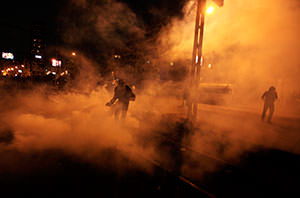Dispatches From Cairo: Bragging About Gang Rape
He couldn't have been more than 19 His clothes were cheap and his sparse yet unshaven facial hair was indistinguishable from the dirt on his cheeks He was with another kid on the other side of a kiosk and couldn't see that I was listening.
We asked Lauren Unger-Geoffroy, an international artist who lives in Cairo, to share her perspective of life in Egypt after the revolution. In this entry, she writes about a frightening walk home in the new Egypt.
Returning a few evenings ago in the crowded women’s metro train car from a meeting in Garden City — the once-plush Cairo neighborhood of embassies and mansions that’s now filthy and filled with crumbling, grimy buildings and garbage-strewn streets like the rest of the city — I was full of brutal and disturbing thoughts.
Just as I had arrived at my stop, the electricity went out as it does at random times almost daily. As I walked toward the unlit tunnel crossing under the tracks toward my street, I shuffled quickly to clump behind a couple with a baby, moving in close to them for security. The darkness in the tunnel was pierced only by the occasional weak light of a cellphone, and I tripped once in a hole, but caught myself.
I was relieved to reach the end and come out into the open, if dirty, air where car headlights gave some illumination. I was thankful that my neighbors, who are always milling in the street among the shouting and honking, couldn’t see me and didn’t stop for the usual friendly greetings. I made my way up my building’s five flights of dim stairs with the aid of my cellphone. Too tired to light more than one candle, I sat in the dark in my apartment for the hour and a half until the electricity came on, thinking about the teenager I had overheard downtown that day bragging to his friend about participating in a gang rape in Tahrir Square.
He couldn’t have been more than 19. His clothes were cheap and his sparse yet unshaven facial hair was indistinguishable from the dirt on his cheeks. He was with another kid on the other side of a kiosk and couldn’t see that I was listening.
He was telling his friend that the women who go to Tahrir Square are hoping to get raped because they want sex. He had heard that sentiment from the popular Salafi TV preacher and ex-presidential candidate Abou Ismail. He said Ismail explained that most of these women are anti-Islam crusaders, and the rest are widows who are looking for sex. They are all devils, he pronounced.
“It is their fault; they are making us do it,” he said laughing, boasting that he was in a group that seized one such devil. He got his fingers inside her, he claimed, and made sure he got her good.
“We are doing a job,” he crowed. “This will keep them from coming to Tahrir. These are not good girls; they are coming for sex. They are rubbing against the men. It is what they want, so we show them what they get.”
His friend asked, “What if your sister goes to Tahrir?”
“She won’t go. She is 11 years old,” he responded. “Anyway, I would beat her if she tried.”
He did not say anything about receiving money for his behavior. Rumors have been circulating that thugs are being paid to rape women to discredit the revolution.
Listening to him I had the same feeling of nausea that I had had when a Salafi friend explained to me the virtues of genital mutilation known as female circumcision.
More than 30 women have been sexually assaulted by mobs in Cairo in the past two weeks of demonstrations. At least one was attacked with a bladed weapon, leaving cuts on her genitals. Twelve women required medical attention. These raping mobs form like random whirlpools in the vast ocean of the crowd, inescapable and invisible from the outside. Their increasing frequency is a symptom of the intensifying disrespect for the authority of the government, and the almost total lack of coherent law enforcement.
This climate of disrespect toward women was further fueled by a recent shocking speech by Prime Minister Hesham Kandil in which he claimed that nursing villager women are so ignorant that they are giving their babies diarrhea by not cleaning their breasts. He also spoke of women being raped in the fields while the men are in the mosque.
These last few weeks of gang rapes have exposed the rotting cultural base of ignorance and misogyny that underlies some elements of Egyptian society and prevents the country from building a stable structure.
A recent front page of the newspaper Al-Ahram Arabic carried the headline “Farmers to be given soft loans enabling them to be able to afford to marry three wives.” The Farm Credit and Development Bank held a news conference along with the minister of agriculture to explain that these loans are being made available to promote the practice of polygamy, which is supposed to help end the problem of unmarried women. Interest paid on a loan for a second wife will be 6 percent, whereas for the third wife it goes up to 15 percent.
Coming home on that night that I had overheard the despicable young rapist, Egypt’s vulnerable women filled the ladies only train car. There was one bedraggled unveiled woman. As usual, the sellers came shouting down the aisle, peddling every cheap thing you can imagine out of their big bags. Everyone looked exhausted — mothers with children, seniors, working women and poor ones. Wealthier people have automobiles or drivers and do not have to endure the metro. A one-legged female beggar was helped through the car by several women pushing her chair. Many gave a coin. The bareheaded woman kept her eyes on the ground the whole way.
Your support matters…Independent journalism is under threat and overshadowed by heavily funded mainstream media.
You can help level the playing field. Become a member.
Your tax-deductible contribution keeps us digging beneath the headlines to give you thought-provoking, investigative reporting and analysis that unearths what's really happening- without compromise.
Give today to support our courageous, independent journalists.





You need to be a supporter to comment.
There are currently no responses to this article.
Be the first to respond.